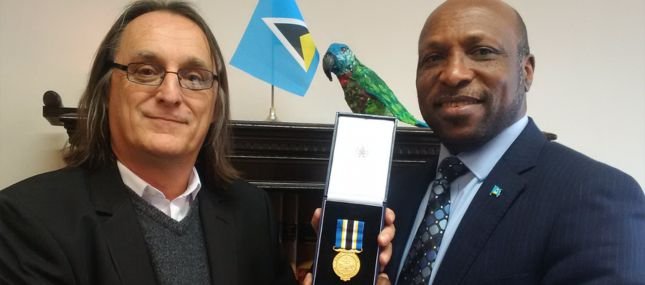St. Lucia is a small island nation in the West Indies subregion of the Americas. Today, the population is around 1.8 lakhs. One can assume the size and scale around 50 years back.
A special species of parrot, known as the St. Lucia Parrot, exists only on this tiny but astonishingly beautiful island. It’s gorgeous, with a vivid turquoise blue face, lime green wings, and a striking red shield on its chest.
In 1977, only one hundred St. Lucia Parrots were left on the island. The population had been decimated by habitat destruction, hunters, and people who trapped them to use as pets. The St. Lucia Parrot seemed doomed; in the words of one biologist, the species “could not escape oblivion by the year 2000.”
Paul Butler was a college student in his last year in 1977, studying at North-East London Polytechnic. Butler had previously spent five weeks completing a field research expedition in St. Lucia, where he had studied the parrot and submitted recommendations for preserving the species.
Post this, unemployment was starring at Butler. But to butler’s utter surprise a receive a letter from the forest department of St Lucia offering him a job with $200 monthly pay and a stay in the rest hut in the forest. They wanted him to work on the “Save Parrot” project further.
Butler accepted the offer rather than remaining unemployed. After joining, the 21-year-old Paul Butler offered three recommendations to the department:
1) Beef up the punishment for capturing and/or killing the parrot.
2) Establish reserves to protect the parrot’s habitat.
3) Raise money by licensing “rainforest tours,” which would offer tourists the chance to see the reserve and its star attraction.
Now, that was out of the scope of Butler’s job. He was a migrant servant to one of the government’s departments, not the government.
For Butler’s recommendations to be put into practice, the island’s laws would need to change, which was possible if he could make people rally behind this initiative.
So Butler, just fresh out of college, working with the forestry department, and armed with a salary of $200, had to raise a mass movement in a country he does not belong to. He had to make people stand behind a parrot that most of them took for granted and would even notice if that disappeared from their country forever.
Neither the parrot has any economical impact nor was it connected with the traditions and cultures of tribes. Poor Parrot, and Paul.
So the clear case for Paul butler was to convince people of St Lucia to save the parrot just because they are kind enough to do so, (and Paul and the forest department wanted to save them).
Butler started this mission with a clear message of “This Parrot is ours, nobody else has that, hence we need to save that”.
Butler organised Parrot puppet shows, cajoled local band to create songs for the bird, distributed t-shirts, convinced local hotels to paint-up parrots on their walls, recruit volunteers to dress up in parrot costumes and visit local schools and asked local ministers to find and chant relevant bible verses. All of these and many of these, tirelessly.

He even talked a telecom company into printing up St. Lucia Parrot calling cards On one card, the parrot was displayed next to the bald eagle, to make it clear who had the better-looking bird.
The St. Lucians began to embrace their parrot, as though it had always been a part of their national identity. The wave of public support made it possible to pass into law.
As the years passed, the species came back from the brink. From 100 to 600 in 10 years. In 1988, the government gave Butler full citizenship and later awarded him the St. Lucia Medal of Merit, the country’s highest honour.

As per 2022 survey there are around 1500 Parrots in St Lucia and for last several decades not a single parrot as been shot down by locals.
Paul Butler has not saved parrots, but had shown what it meant to take pride in the diversity the mother earth has blessed them with.
Today I am sharing this incident on world earth day so that we know that we too need to take pride in the beauty of whatever piece of earth we live on. Can we all do at least one of the following 4 things to express our pride and gratitude towards this mother earth.
1. Don’t feed birds and animals around. Yes it’s tempting for whatever reasons it can be, but feeding them can do more bad to us and them both, then good.
2. Plant local plants. Don’t try to look for fancy. Plant trees and plants which are native to your area.
3. Shrink your lawn. The green lawns look great but do least to the environment. Consumes a lot of space, a lot of water and gives back least to the ecology in general, forget the economy of maintaining it. So be wiser in giving space to lawn.
4. Eat at least one plant in a quarter that you have grown yourself. It can be any fruit or leafy vegetable.
Greetings of national earth day.
Note: I have read this incident from the book “Switch”. Chip and Dan Heath has made this book full of such incidents teaching us how to bring a change in whatever we are at! Photograph credits to Rare.org
